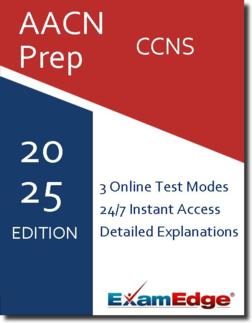AACN CCNS (ACCNS-A) Practice Tests & Test Prep by Exam Edge - Topics
Based on 29 Reviews
- Real Exam Simulation: Timed questions and matching content build comfort for your AACN CCNS test day.
- Instant, 24/7 Access: Web-based AACN Adult Acute Care Clinical Nurse Specialist Certification practice exams with no software needed.
- Clear Explanations: Step-by-step answers and explanations for your AACN exam to strengthen understanding.
- Boosted Confidence: Reduces anxiety and improves test-taking skills to ace your AACN Adult Acute Care Clinical Nurse Specialist Certification (ACCNS-A).



